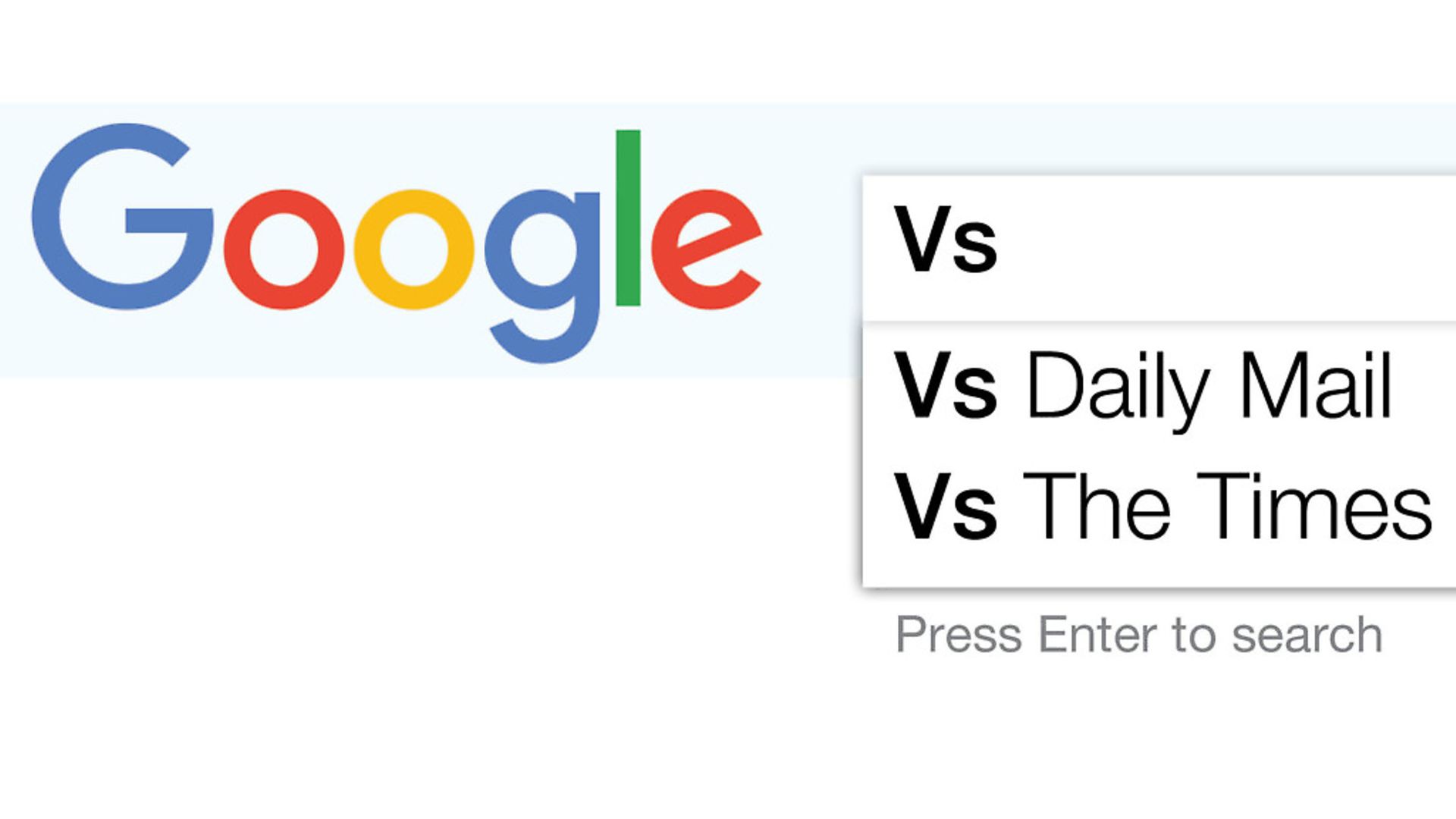
Newspapers have waged along battle against the titans of the internet. But in there are double standards to be found in their latest line of attack
You could almost touch the Fleet Street schadenfreude in recent days, as big-name advertisers walked away from YouTube after finding themselves appearing on the website alongside the output of Islamic extremists and other hate material.
‘At last!’ proclaimed a Daily Mail leader article, hailing the ‘fightback against web anarchy’. Google (which owns YouTube) rightly stood accused of profiting from hatred, it said: ‘Day after day, the already deeply tarnished reputations of the filth-peddling, tax-dodging terror-abetting internet behemoths sink lower into the mire.’
For many years, Google, Facebook and Twitter had wilfully turned a blind eye to poisonous content, it continued. But now the day of reckoning had arrived. The BBC and Whitehall had pulled their ads. And when banks, supermarkets and Marks & Spencer joined the boycott, there was more from Dominic Lawson on the ‘utter shamelessness of the filth-peddling web giants’.
For The Times, which set the ball rolling with an investigation by Alexi Mostrous, this was the ‘shaming of Google’, which should now face up to its responsibilities.
The Mail and the Murdoch stable hate the internet giants because they think they are stealing their revenue and readers. Having long had the field to themselves, newspapers resent the interlopers.
Free marketeers all, they just can’t stand competition. It’s the same as their gripes against the BBC (publicly funded left-wing propaganda – just look at that anti-Brexit Countryfile) but writ larger. Essentially, their cry is: ‘It’s not fair!’
Murdoch titles dominate the British print media and his Sky channels dominate the satellite television market. The Sun and Times reach 31 million people a month, according to the National Readership Survey, and figures from the British Audience Research Bureau suggest that the Sky channels between them achieved a total audience of about 8 million last week. The Mail is the most successful news website in the world and its print and online offerings now reach 29 million a month. But they want more.
That said, their latest assaults on Google represent a valid inquiry – the speed with which MPs and big businesses responded proves as much – and it has thrown up three distinct strands:
• the extremist content itself;
• the algorithms that place advertisements alongside these extremist videos;
• the fact that money generated by the ads goes to the video makers, and so funds extremism;
One of the biggest beefs of Fleet Street is that the internet is not regulated. British newspapers, they say, are subject to the toughest regulatory system in the world. They invest money in journalism and strive for accuracy, but their very existence is being imperilled by people like Gary Lineker who can reach millions with a tweet that turns out to be misinformed. And don’t get them started on fake news. (Well, actually, they’ve already started with the News Media Association’s submission to the Culture, Media and Sport Committee’s inquiry saying there should be a government investigation into Facebook and Google – but ‘don’t bring in any new rules for us’).
The Mail warmed to that theme in its leader column on Saturday, accusing the web giants of ruthlessly invading the privacy of their users by gathering and exploiting personal information. ‘Meanwhile, endless fake news and blatant libels are spread with impunity around the world.’
Impunity? They must have short memories in Kensington; only a few days before, the Mail Online’s own columnist Katie Hopkins was told she must pay libel damages and costs over a tweet.
For a technophobe who does not use a computer, Mail editor Paul Dacre seems remarkably well-informed about the ‘vile’ material all over the web and its malign effects on society. His newspaper has run countless stories on the subject and appears to be of the opinion that all such material – porn, fanaticism, body-shaming – should be removed. Yes, some of it is execrable, but wouldn’t that be censorship, an attack on free speech?
Advertisers seem more concerned about their good name than about removing content from the web. They don’t want to be associated with inappropriate material. If Google cleans up its algorithms, they’ll go back.
Then there’s the notion that advertisers and their customers and, in the case of Whitehall, the taxpayer – are inadvertently funding hate because a proportion of the fees they pay ends up in the hands of the people producing the page on which their ad appears. The papers say this adds up to hundreds of thousands of pounds. Google says it is ‘pennies’.
So the Mail could be said to be in favour of the ad boycott to force the removal of material that spreads hate and fear. Wait a minute. Funding hate? Ad boycotts? Material that spreads hate and fear? Doesn’t all that sound familiar?
For the past eight months a group called Stop Funding Hate has been trying to persuade household names not to advertise with the Mail, Sun and Express while they continue to run so many anti-immigration stories.
It chose those three papers because they were called out by the UN for the tone of their coverage. The organisation argues that it is not good for companies to be associated with such a material, that the newspapers are profiting from spreading hate and fear, and that by advertising with the newspapers, advertisers are effectively using their customers’ money to fund those hate messages.
This is what the Mail had to say in a leader article about that:
‘A more malicious threat comes from Left-wing campaigners who seek to blackmail firms into withdrawing advertising from newspapers with which they disagree.
Particular targets are those, like the Mail, which voice public concerns about mass unrestricted immigration and the wanton waste of taxpayers’ money on overseas aid, while the elderly and vulnerable suffer at home. But with fair-minded companies refusing to be bullied by groups such as Stop Funding Hate, this assault on free expression can also be overcome.’
So far only Lego and the Body Shop have shown tangible support for the SFH campaign; most other advertisers – including some that have pulled away from Google – have responded along the lines that they have no say in what appears near their ads. But their reaction to the Google ‘scandal’ proves that they think they do, or at least that they do not want to be seen alongside material that runs counter to their brand image. This is exactly the judgment SFH is asking them to make about the newspapers.
The newspapers’ position is this, then:
• It is censorship for campaigners to ask advertisers to influence the mindset – as opposed to the specific content – of newspapers
• It is not censorship for the Press to demand that Google removes material from its platforms
• It is not censorship for advertisers to seek to influence what appears on Google’s websites
Of course, it’s all a question of scale. There are some really bad people on the web advocating some really nasty stuff. We can see how lives could be put at risk, so it’s an easy call for M&S to say it doesn’t want to be shown alongside real people with real guns and bombs (as opposed to the ones in Homeland).
It’s harder to take a stand against a stream of prejudicial headlines, especially when those headlines are delivering the very Middle England readership it wants to talk to. But there is evidence from a number of respected sources, not simply lobbyists, that lives are being blighted – and possibly endangered – by some of things printed in our newspapers. A lot of blind eyes are being turned.
And here’s a thing. In listing obviously offensive and extremist videos from ‘terror groups, neo-Nazis and homophobes’, the Mail reported: ‘An investigation by The Times found that the Home Office, Royal Navy and Royal Air Force all had advertising promotions placed beside video rants from ‘shock-jock’ Michael Savage, who infamously told one gay caller he should ‘get Aids and die’.’
The often-offensive Savage Nation podcasts pull no punches, but they come with a health warning of ‘adult content, adult language and psychological nudity’, and they are sufficiently mainstream for the presenter to have been inducted into the radio hall of fame last November.
If it is reasonable for advertisers not to want to be associated with his output, what about the output of a woman, like Katie Hopkins, who calls refugees cockroaches or a man, Kelvin MacKenzie, who thinks it’s outrageous for a newsreader wearing a hijab to report on a terrorist attack?
Liz Gerard worked on national newspapers for 40 years. She now blogs on Fleet Street at www.sub-scribe.co.uk











